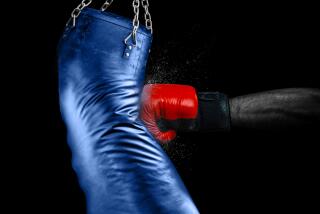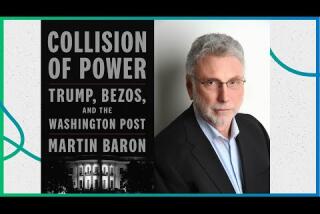The New Look at Kinsley’s New Republic
Magazines and newspapers glitz you these days almost as readily as television does (“to glitz,” a neotransitive verb meaning to jazz up in order to grab, sock, sell-it-to-you fast). Color on Page 1. Snappy writing. Splashy layout. Short takes for short attention spans. Even street-sale boxes that look like TV sets.
OK, it’s one thing for newspaper life to imitate TV art at the upstart USA Today, but at the New Republic, home of the Old Liberals? Have you taken a look lately?
--June 22 cover: “Mrs. T.” (also known as British Prime Minister Margaret Thatcher), caricatured in Union Jack bikini flexing her Iron Lady muscles.
--Oct. 5 cover: “Paul Simon, your 15 minutes have arrived,” and they don’t mean singer Simon, but the Illinois presidential hopeful.
Behind these not-so-pretty faces is Michael Kinsley, editor, columnist and now book author, who believes that being serious and being lively are not incompatible. As the columnist who signs himself TRB for the New Republic, he’s the liberals’ answer to George Will, and he probably would hate being so labeled. Like Will, he lives in Chevy Chase, Washington’s upscale but old-shoe Maryland suburb, although he points out that his neighborhood is two steps away and one step down from Will’s.
Kinsley agrees with the general theory that TV has extraordinary influence on its times. “Quickness, the slickness, the photographs are a result of television. You certainly see it in USA Today. In terms of the New Republic, I would deny it. The New Republic is modeled after the great political literary weeklies of England, really, the Spectator, the New Statesman. All the great English essayists’ stuff appeared there. They wrote things that are much shorter than the typical American magazine article. . . . There is no necessary correlation between wisdom and length.”
In Los Angeles to promote his new book, Kinsley was quick to share the credit for the New Republic’s new verve with other key staff people. But reading the new book--”Curse of the Giant Muffins and Other Washington Maladies” (Summit: $17.95)--heck, even making it through that title--gives you a clue to the source of some of the magazine’s informing intelligence.
The title, for example, is Kinsley’s way of showing the way departing Washington officials have of pleading poverty as they march off to cash in on their marketability in the private sector--they have their epiphany about needing more money when forced to choose between buying Thomas’s English muffins and the local generic Giant Store brand. Thus, the curse of the giant muffins.
“First of all,” Kinsley writes, “I don’t want any grief about throwing together a bunch of old articles and calling it a book. If you think that’s cheating, don’t buy it. For myself, I like reading old magazine articles--my own of course, but even other people’s. Among other things, it’s a way to recapture the flavor of the recent past. If this collection has any lasting value, it’s as a survey of the political moods and obsessions of the early and mid-1980s--the Reagan era.”
In and Out of Power
One of the obsessions of this and any other era is being in power and being out of power. How hard should you push for your goals when you’re in, because of the equal and opposite reaction that will occur when you’re out? Another obsession is what kind of press you get, even if you’re part of it. When you pair these, you have truly magnificent obsessions. And this is the backdrop against which Michael Kinsley operates as what the National Journal called one of the “150 who make a difference.”
In such surroundings, no columnist is immune from taking as well as giving his lumps. This summer, for example, Kinsley wrote a column in which he called Reagan’s fall from grace a laughing matter, as in “Ha, ha, ha,” which were his last three words. “C’mon, everybody,” said Kinsley’s column, not in the new book, “admit it. We’re on a high.” Kinsley had said what some were thinking, but most had filtered it out of their work and their words.
‘Mock-War Games’
Washington Post columnist David Broder worried in print that Kinsley’s crowing about Reagan’s ill fortunes in the Iran- contra affair would drive the President into the same bunker mentality that destroyed Richard Nixon. “Spare us these juveniles who won’t learn or can’t understand that the presidency is too damn important for their mock-war games,” said Broder, normally slow to anger. He urged Reagan to listen to the grown-ups who were not dancing on his political grave but were urging him to repair the damage.
In the months since he wrote that column, Kinsley finds more people firing salvos at Reagan now that his second term is almost over. The pendulum may be swinging away from the conservative point of view as part of what Kinsley considers a normal “dialectical process of ideas.”
The protests of the ‘60s “led to a backlash in the late ‘70s--culminating in the Reagan Administration--against big government, taxes, and so on and so forth. And now I think--I hope and I also think--that people are coming to realize that this vision is rather sterile, that we need the government to do many important things: cure AIDS, give us decent public schools, run the airline network so that planes don’t crash. All that it requires now is some politician with the courage to say you have to pay for these things, and we’re all set.”
Inside Chatter
This talk of what columnist disagrees with whom and who is in power and who isn’t is the kind of inside baseball chatter that Washingtonians love. But it has relevance to those outside the Beltway as well. It sets the tone for the hothouse Washington discussions, and out of those discussions come the laws and the leaders of the land. So who then is this bright young man and how did he get to say all these things at 36?
Michael Kinsley was born in Detroit, grew up in the suburbs, went to a private school named Cranbrook, was graduated from Harvard College and was a Rhodes Scholar at Oxford University. After his second year at Harvard Law School, he worked as a summer associate (read “intern”), first at a San Francisco law firm called “Steinhart and eight other names” and then in Los Angeles at Gibson Dunn & Crutcher.
He decided that if he had to practice law, he wanted to do it in Los Angeles. But he didn’t want to practice law; he wanted to be a journalist. He had been a copy boy at the Detroit News in 1967, the summer of the major riots there, and thought it was an exciting field. “I’ve never changed my opinion,” he adds.
‘Obscure Publication’
Kinsley landed a job at the New Republic when it was “a rather obscure publication going through a rather lame phase.” Now it’s “gotten much more prestigious and much more noticeable. I hope I have something to do with that.” He does not consider himself a member of any journalistic equivalent of the literary brat pack, nor an overnight sensation. First of all, Kinsley says, he’s older than they are, and second, “It’s not as though all this landed in my lap. I’ve been really lucky, but it could have gone the other way. The New Republic could still be languishing and it could have all not worked out.”
Kinsley’s legal training is most evident in his Oct. 7 New Republic editorial presenting the case against confirmation of Robert Bork as a Supreme Court justice. Far from being the nation’s usual “cheesy and trivial” political dialogue, the Bork controversy represents “an astringent debate over . . . principles,” the editorial said. As a magazine editor, Kinsley struck hardest at Bork’s views on freedom of speech, which he called the nominee’s “scariest and least supportable” because Bork characteristically sees a limited court role in protecting that freedom.
A Special Foresight
The New Republic editorial concluded that while judges “need enormous intellectual integrity . . . they also need vision. By the definition of their constitutional role, they must see things the majority doesn’t see.” In 1971, the editorial said, Bork saw the wisdom of the landmark school desegregation case, Brown vs. Board of Education. “By then, so did most people. Would he have seen it in 1954?” Reagan and the nominee have decided what kind of court they want, the editorial concluded; now the Senate, speaking for the people they represent, must decide “whether it wants the same thing.”
Kinsley, then, still gets to exercise that legal mind. Does he ever have nostalgia for the law?
Only when he watches “L.A. Law.” He loves California, and he liked his time at Gibson Dunn. Back then, at least, it was a firm that “took the law very seriously but in a very different way than the way Eastern operations take it in that they said we’re going to practice very good law until 5 o’clock and then we’re going to the beach. I thought that’s fine--if you’re going to practice law, that’s the way to do it. You’re not going to pretend that it’s important enough to swallow up your whole life. . . . “
More to Read
Sign up for our Book Club newsletter
Get the latest news, events and more from the Los Angeles Times Book Club, and help us get L.A. reading and talking.
You may occasionally receive promotional content from the Los Angeles Times.






